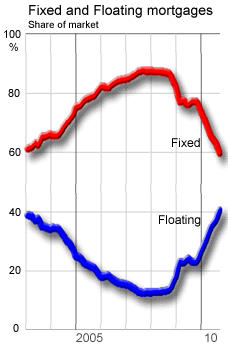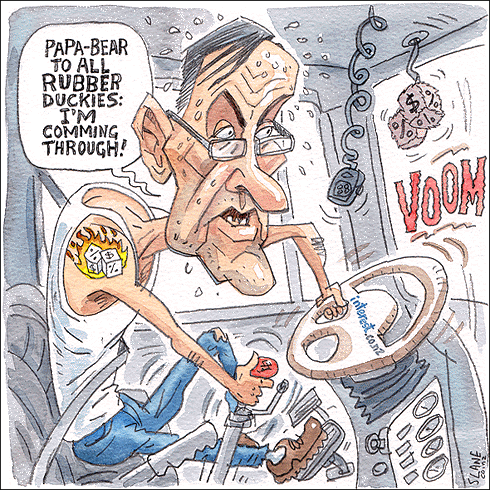It's quite possible that this time next weekend when you sit down to read or watch this with a cup of coffee and some toast that you'll be asking yourself whether you can still afford the coffee and toast.
If you have a floating rate mortgage then it's quite possible that by next weekend your bank will have increased the floating rate by around 25 basis points to around 5.9%. That will cost anyone with a NZ$200,000 mortgage an extra NZ$10 a week. See all bank mortgage rates here.
That's because the Reserve Bank is widely expected to increase the Official Cash Rate (OCR) from 2.5% to 2.75% this coming Thursday to start withdrawing some of the monetary stimulus being pumped into an economy well into its recovery phase.
Reserve Bank Governor Alan Bollard has rightly described himself as a truck driver who wants to take his foot off the accelerator before the economic truck barrels too quickly into the upcoming corner of higher inflation. In previous tightening cycles the immediate knee-jerk reaction for anyone still left on a floating mortgage would be to jump to a fixed mortgage, often a 2 year rate, which was usually cheaper anyway.
But this time it's different. Most 2 year mortgage rates are around 7.3% and they are also likely to rise soon after the Reserve Bank puts up the OCR. Anyone choosing to jump to a fixed rate would immediately see their NZ$200,000 mortgage cost them an extra NZ$60 a week. The coffee and toast would definitely be off the menu. The reason it's different this time around is the Global Financial Crisis.
 Despite being nearly two years since the collapses of Bear Stearns and Lehman Brothers triggered the worst financial meltdown since the Depression, the world of banking has not gone back to normal. Between 2002 and 2007 the banks were able and willing to borrow cheaply on 'hot' international money markets and then shovel it on to mortgage borrowers here in New Zealand at fixed rates that were almost always cheaper than the floating rate.
Despite being nearly two years since the collapses of Bear Stearns and Lehman Brothers triggered the worst financial meltdown since the Depression, the world of banking has not gone back to normal. Between 2002 and 2007 the banks were able and willing to borrow cheaply on 'hot' international money markets and then shovel it on to mortgage borrowers here in New Zealand at fixed rates that were almost always cheaper than the floating rate.
That meant the Reserve Bank had to tap the brake on the truck even harder to make it stop. Now the banks are either unwilling or unable to uses those 'hot' money markets any longer. Their shareholders don't want their banks to rely on such an unreliable sources any more and the Reserve Bank is forcing them to raise more of their funding from local and longer term sources. This funding is harder and more expensive to get.
This Reserve Bank pressure to wean the banks off the 'hot' markets is expressed through its Core Funding Ratio, which is currently set at 65% and will rise to 75% over the next couple of years. This is one of the reasons why the Reserve Bank has repeatedly said that the increase in the OCR coming down the road through late 2010 will be slower and less severe than in the past.
A lot of the work is being done by this Core Funding Ratio. It could be called an engine brake, which is helping to slow the truck and will avoid more severe use of the regular foot or hand brake.
All this means that floating mortgage rates are likely to stay lower than fixed rates for some time and any increase in floating rates will not be as severe or as fast as in the past. The coffee and the toast may well survive the weekend.
It's worth having a look at the maths of a floating versus a fixed mortgage. Anyone choosing to fix at 7.3% for two years would need the Official Cash Rate and floating rates to rise by at least 3% over the next 2 years to be 'in the money' compared with floating.
Currently, financial markets estimate the OCR will rise just 1.5% over the next year. Most economists are now saying the neutral rate for the OCR is around 5%, rather than the 6% it was at before the Global Financial Crisis.
Peace of mind
My view is that the OCR will not be increased much more than that 5% in the next two years. Bank lending is very constrained because of the 'engine brake' of the Core Funding Ratio and core inflation remains very subdued. Governor Bollard has also signalled he won't put the OCR up so far or so fast this time around.
Some people will prefer a fixed mortgage for peace of mind's sake and to have a set interest payment for longer term planning. That's fair enough. But this time around it won't be the obvious choice simply because it's cheaper at the moment. Fixed mortgages may remain more expensive than floating rate mortgages for years to come, particularly as the Core Funding Ratio is due to be lifted from 65% to 75% over the next 2 years, keeping funding costs high for the banks.
Those current expectations of floating being cheaper than fixed are reflected in the chart published here, which shows the proportion of the total mortgage book that is on floating rates has almost trebled from a record low of 12.5% at the end of the housing boom in September 2007 to a six year high of 33.5% at the end of April this year. KPMG estimates that 60-70% of new mortgages now being written are floating.
Floating is definitely the most popular option at the moment.
Your thoughts? We welcome your comments and questions below?


We welcome your comments below. If you are not already registered, please register to comment
Remember we welcome robust, respectful and insightful debate. We don't welcome abusive or defamatory comments and will de-register those repeatedly making such comments. Our current comment policy is here.